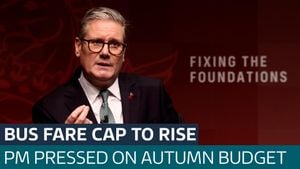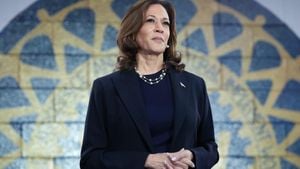With one week to go until the pivotal 2024 U.S. presidential election, the political arena has become intensely charged as Vice President Kamala Harris and former President Donald Trump deliver their closing arguments to the American electorate. Both campaigns are racing against the clock, vying for votes in the battleground states as the stakes continue to rise with each passing hour.
Harris took the stage on Tuesday at The Ellipse—an emblematic site just south of the White House, historically significant for its connection to the January 6 insurrection. She aimed to invoke stark contrasts between her vision for the country and Trump’s long-established record. "American patriots didn’t struggle, sacrifice, and lay down their lives only to let themselves submit to the will of another petty tyrant," Harris proclaimed, attacking Trump directly. Her speech was delivered to what her campaign estimated to be 75,000 attendees, significantly larger than the crowd Trump attracted on the same grounds during his incendiary 2021 address.
Preparations for the upcoming elections have seen more than 53 million early votes cast, with Harris emphasizing the urgency of voter participation. "We've got to turn the page on this divisive Trump era," she added, underlining her campaign's call for unity and progress. Her remarks were framed not just as rhetoric, but as a commitment to address pressing issues such as healthcare and economic stability.
Trump, who held rallies of his own following Harris’s address, juxtaposed his campaign’s message against what he described as Harris’s "campaign of hate." Speaking at Mar-a-Lago and, later, during his Allentown, Pennsylvania rally, Trump criticized Harris's rhetoric and sought to project his administration as one of solutions, saying, "We’re welcoming historic numbers of Latinos, African Americans, Asian Americans, and citizens of every race, religion, color, and creed." His campaign seeks to position him as the champion of all Americans, steering clear of what he perceives as divisive political tactics.
Elections are often defined by controversies and this election is no different. Recent remarks made by President Joe Biden at the Voto Latino campaign call sent ripples through the partisan waters as he referred to Trump supporters as "garbage." Response came swiftly from Republican circles, drawing comparisons to Hillary Clinton's infamous "basket of deplorables" comment. Senator Marco Rubio and Trump's campaign spokesperson were among those quick to seize on the opportunity to criticize Biden, framing his remarks as emblematic of broader Democratic disdain for many Americans.
Meanwhile, Trump's Madison Square Garden rally recently drew mixed reactions after comedian Tony Hinchcliffe’s controversial comments about Puerto Rico. Acknowledging Hinchcliffe’s divisive speech about the island, Trump sought to distance himself from the fallout, stating, "I have no idea who he is" and noted, "It's nobody's fault, but somebody said some bad things." Nonetheless, the incident has been leveraged by Harris’s campaign, aiming to highlight what they frame as the toxic environment surrounding Trump rallies.
Both candidates are acutely aware of the importance of swing states, and Harris’s campaign has been proactive, with stops across several battleground states, including Texas, where she appeared alongside Beyoncé. The event underscored the Democratic strategy of mobilizing young voters and communities affected by recent Supreme Court decisions, especially those concerning reproductive rights.
Former First Lady Michelle Obama has also stepped back onto the campaign trail, emphasizing the necessity for political engagement, especially among young voters. “You all are going to be the ones left to clean up the mess,” she warned during her rally speech, rallying support for Harris by underlining the stakes of the election.
Trump’s candidacy, on the other hand, has brought forth reactions from various sectors of society, including endorsements from Muslim and Arab American leaders, seemingly at odds with past policies from his presidency. His attempts to recapture support from these voters appear aimed at ensuring every possible demographic is reached as the election approaches.
Political analysts suggest strategies employed by both candidates reflect their broader narratives. Harris is focused on policies and appealing to voter emotions connected to hope and change, as opposed to Trump's approach, which often centers on grievance and nostalgia.
This election season has undeniably been one marked by fervor and fervent discourse. The rhetoric employed by both sides highlights the deep divides within the American electorate and sets the stage for what could be significant shifts within the political fabric of the nation. It is clear both candidates are not just addressing the voters, but are also sending messages to each other, reinforcing their respective narratives as they battle for the hearts and minds of the American public.
Moving closer to Election Day, voter turnout remains the key ambition for both candidates. Harris’s elaborate groundwork mirrors the urgency of addressing issues directly affecting American families, healthcare, and economic recovery, which she argues are at stake. Meanwhile, Trump's appeal rests on his controversial yet familiar political persona, promising to sustain support across diverse demographic groups familiar with his campaigns.
Regardless of how the next week plays out, we’re witnessing the latest chapter of political combat between two polarizing figures, each vying to lead the country through what they argue are vastly different visions for America’s future. Each rally, speech, and campaign stop is not merely about votes; they're strategic plays—chances to grab headlines and solidify support, transforming the pre-election limelight—a spotlight on their political legacies as Election Day draws ever closer.
The dynamic between hatred and hope, grievance, and healing will be tested fully come November 5 as the electorate heads to the polls, making the decisive choice on who will occupy the highest office in the land.



